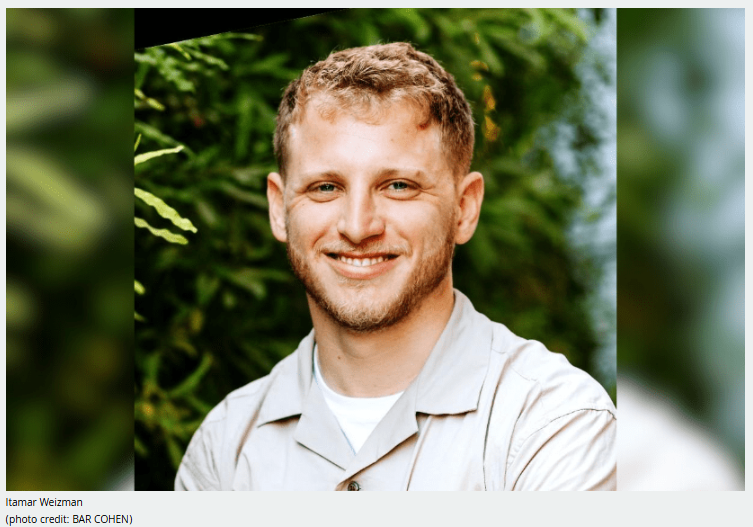Itamar Weizman, partner, and head of climate tech at Firstime Ventures, is part of the next generation of venture capitalists who are on a mission to fund the technologies that many believe will help solve one of humanity’s most pressing issues – runaway carbon emissions and the resulting climate change.
You were a campaigner for Greenpeace when you were younger, you co-founded V15 (the political supra movement active in the 2015 elections), and today, you invest in climate tech. Where do you get your drive to make the world better?
There’s nothing really special about me – it’s that I grew up in a society, an environment, and a community where these values were at the core. Whether it was taking responsibility for the country I’m living in or taking responsibility for the community that is surrounding me.
How did you go from activism to hi-tech?
I was one of the first employees of Mindspace. This was 11 years ago, and I had the opportunity to see and meet a lot of tech companies. The folks who rent spaces at Mindspace are up-and-coming startups, not mature ventures. They are people who are just starting something, and I was super curious. I ended up being more interested in their work than in my work, and I learned a lot from working with entrepreneurs.
How did your journey in climate investing begin?
About three or four years ago, I had the honor of joining Firstime as a partner. It was clear to me, and to my Partners as well, that the climate crisis is a long-term, fundamental change in our economy, our society, our financial system, and our technologies. So, we decided to shift our direction from the first decade of Firstime – which was more general VC investing in software and AI – to a more thematic and impactful approach.
What is a MUST for you before deciding to make an investment? What does your due diligence focus on?
Before deciding to make an investment, a must-have for us is a strong alignment with our investment thesis. We want to ensure our companies are focused on solving large-scale, critical climate challenges.
It’s clear that climate technologies often require massive investments in later stages, so we need to make sure the company has a clear path forward toward profitability. Other than that, our due diligence process focuses on the quality and experience of the founding team, the validity of the science and product, scalability of the technology, market potential, and more.
What makes you go ‘Wow’ when you meet a founder or a company pitches you?
I’m most impressed by founders who are courageous and take on moonshot challenges in the climate tech space rather than just chasing where the money currently is. These founders are driven by a bold vision to solve the toughest problems, which is exactly what the industry needs.
How has what you look for now in a company changed compared to two or three years ago?
The market has evolved significantly, and there are now far more interesting companies emerging in the climate tech space. We’re seeing incredible ventures in areas like carbon removal, sustainable agriculture, and the circular economy. The focus has shifted from early-stage concepts to more mature, impactful solutions addressing critical environmental challenges, making this an exciting time to invest in the sector.
Have you had any companies you turned down come back and re-pitch you, and are any of them in your portfolio?
Yes, we’ve had companies come back and re-pitch us, and some have ended up in our portfolio. We appreciate founders who are persistent, take feedback seriously, and come back stronger. It shows resilience and a commitment to improving their business.
Are there companies that you turned down that wish you’d invested in?
Yes, there are tens of them. I always like to look at Bessemer’s anti-portfolio. They honor the companies that were successful that they didn’t invest in. Apple, Airbnb, eBay. About Facebook, they said they told Mark Zuckerberg, ‘Kid, haven’t you heard of Friendster? Move on, it’s over.’ This was in 2004, so you know… This is one of the largest venture capital firms in the world. They said no to Google, to Intel, to PayPal, to Zoom… So obviously, every successful venture capital, from Bessemer to Firstime, makes mistakes.
Could you share a little about some of your portfolio companies?
I’d like to mention two that are really outstanding. One is BeeHero. They’re poised to become a unicorn. They help save the world’s food supply by making sure pollination is available globally through a unique chip that they’ve already put in quarter million hives – a quarter million hives.
Do you have partnerships or collaborations with other VCs or investors? How do you think VCs can collaborate to increase the ROI of their investments?
Yes, we actively collaborate with other VCs and investors, as partnerships are crucial in the venture ecosystem. By sharing deal flow, insights, and expertise, we can better support our portfolio companies and make more informed investment decisions. Collaboration helps syndicate deals, reduce risk, and bring diverse perspectives to the table.
How would you sum up the past year, and what do you anticipate from the upcoming year?
We’ve seen a lot of challenges in Israel in the past year, but this also attracts supporters… Folks see this as an opportunity to rebuild and invest further. I hope that once the war ends, we’ll see a recovery, which will benefit everyone. But you can’t take away the fundamentals of the Israeli startup nation.



